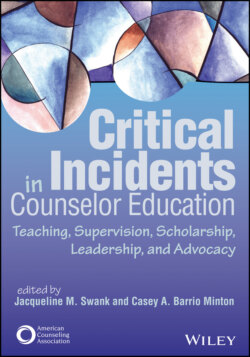Читать книгу Critical Incidents in Counselor Education - Группа авторов - Страница 54
Instructor’s Role and Responsibilities
ОглавлениеA key component of well-designed SL experiences is the quality of the preparation that instructors provide their students (Cavazos Vela, 2020). Providing Beth with more preparation might have reduced the potential for some of the problems she experienced. It is important for participants in SL to understand that they are expected to work collaboratively with their community partners (Kaye, 2004) rather than function independently. Professor Edwards might have provided his students with reading assignments to familiarize them with the nature and purposes of SL projects in general and the specific programs in which they would be participating. Professor Edwards might also have required his students to meet with or interview community partners prior to beginning their SL experiences (Cavazos Vela, 2020). Although CMS provided Beth with training that prepared her for her role as a cofacilitator, the preparation she received from Professor Edwards for the SL project was inadequate.
Instructors are responsible for ensuring that SL experiences are integral to the course they are teaching (Caruso et al., 2006; Cavazos Vela, 2020). Professor Edwards appropriately connected the SL project to a course objective. He ensured that students understood the SL project as an integral component of the Human Development course. As a final requirement for the SL project, students presented a poster session; this ensured that the project was integral to the content and structure of the course (George et al., 2015).
An essential characteristic of SL projects is students’ reflections on their SL experiences (Caruso et al., 2006; Kaye, 2004). Professor Edwards included reflection assignments before and after the SL project, which is key to ensuring that students incorporate SL experiences into their own identity development (Caruso et al., 2006; Kaye, 2004). Examples of reflection prompts before a SL project might include “What do you anticipate your relationship with your SL supervisor will be like?” or “What do you hope to learn or accomplish?” (Cavazos Vela, 2020). Examples of reflection prompts after a SL project might include “What did you learn from your SL project?” or “In what ways did the project influence the development of your professional counselor identity?” (Cavazos Vela, 2020). In addition, Kaye (2004) recommended that students complete daily written reflections during the project. It is essential for students to continually reflect on what they are learning and how it is affecting their values, learning, identity, and feelings. Written daily reflections help students make connections between their experiences and course content and promote the incorporation of learning into their identity development. Instructors should require students to submit these reflections as they are completed so they can continually support and monitor performance in a timely manner throughout the experience.
Instructors should ensure that they maintain good relationships with school and community partners (Lloyd-Hazlett, 2018). Cavazos Vela (2020) recommended giving partners the opportunity to provide feedback on the quality of their relationship with the student, feedback on the quality of the student’s performance, and recommendations for improving SL projects. Requesting feedback communicates that community partners are valued and strengthens relationships. This case illustrates the importance of maintaining open communication throughout the SL experience. Professor Edwards could have achieved this by providing the SL supervisor with an evaluation form to complete at the project midpoint, including questions related to the student’s strengths and challenges and recommendations for improvement. It is also good practice to schedule intermediate conversations in which SL partners can share their impressions of the student’s performance. These measures strengthen communication and the quality of the relationship between the instructor and SL supervisor and improve the quality of support provided to the SL student. In the present case, the quality of this relationship was not good, and Beth’s developmental needs were underserved.
Finally, instructors should recognize that student evaluations are based on the quality of their reflections and related assignments (e.g., papers, poster sessions) rather than the quality of their on-site performance (Cavazos Vela, 2020). In the current case, Professor Edwards recognized that it would be unfair to evaluate Beth on the basis of the quality of her performance at CMS. In addition, it is worth noting that the SL supervisor’s illness and the lack of communication between Professor Edwards and Ms. Mitchell were beyond Beth’s control. Professor Edwards’s emphasis on the quality of her reflections was appropriate, and it also potentially ameliorated Beth’s feelings of embarrassment and shame. As a result, Beth was more likely to be able to fully reflect on and process her decisions and actions and to learn from her SL project.
